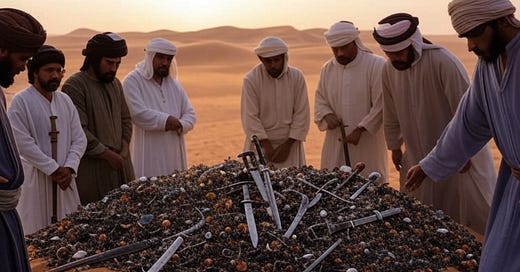Booty and the 'Prophet's' War Aims
How Fighting 'For the Cause of Allah' can be Rather Lucrative
According to Islamic tradition, Islam expanded very fast during Muhammad’s lifetime. At least a part of this expansion was based on military conquest. This leaves an obvious question: How were the expensive military campaigns in which he constantly engaged financed?
A large part of the answer can be found in the fact that Muhammad allowed his followers to raid merchant caravans. As the military might of the Muslims grew, it was made clear that the collection of war booty was an important objective. There is even an entire chapter in the Qur’an (Chapter 8) entitled “Booty”. A remarkable inclusion in a supposedly peaceful holy text.
Here are some of Muhammad’s reassurances to his followers stating that enriching themselves for the Muslim cause through the collection of booty was completely acceptable:
• “Allah promiseth you much booty that ye will capture, and hath given you this in advance, and hath withheld men’s hands from you, that it may be a token for the believers, and that He may guide you on a right path” (Qur’an 48:20)
• “And that which Allah gave as spoil unto His messenger from them, ye urged not any horse or riding-camel for the sake thereof, but Allah giveth His messenger lordship over whom He will. Allah is Able to do all things” (Qur’an 59:6)
• “Now enjoy what ye have won, as lawful and good, and keep your duty to Allah. Lo! Allah is Forgiving, Merciful” (Qur’an 8:69)
Some Muslim apologists try to justify these incitements, to what can only be described as blatant theft, by stating that there was a strategic need to rob the Meccan caravans. You have to wonder, however, if those who were forced at the point of the sword to hand over their belongings would have seen the theft of their property as anything but an expression of naked greed. The question also must be asked: What was the “strategic necessity” behind the fact that a significant percentage (20%) of this booty flowed directly to Muhammad?
In the Qur’an, Allah takes particular care to ensure that Muhammad gains significant personal financial benefit from all the raiding and thieving in which he commanded his followers to engage. This was done through the command that one-fifth of the spoils of war and raiding had to be paid over to him (Qur’an 8:41).
There must have been serious concern among at least some of the followers of Muhammad that this decree departed significantly from the tradition of earlier prophetic figures who embraced lives of simplicity and who shunned the acquisition of wealth. Muhammad remedied this problem by placing an exemption from this rather inconvenient prophetic tradition in the mouth of Allah: “The Booty has been made Halal [lawful] for me yet it was not lawful for anyone else before me” (Sahih Bukhari Volume1 Book 7 Hadith 331, a similar statement can also be found in Sahih Muslim Book 4 Hadith 1058).
So, it is clear that raiding and capturing the property of others was established as a legitimate source of income for Muslims (as long as Muhammad got his percentage). Many of his followers responded to this open invitation to enrich themselves through the use of violence with enthusiasm.
Here is just one example, as retold by an early follower of Muhammad: “The Prophet again said, ‘Anyone who has killed an enemy and has proof of that, will possess his spoils.’ I [again] got up and said, ‘Who will be a witness for me?’ and sat down. Then the Prophet said the same for the third time. I again got up, and Allah’s Apostle said, ‘O Abu Qatada! What is your story?’ Then I narrated the whole story to him. A man [got up and] said, ‘O Allah’s Apostle! He is speaking the truth, and the spoils of the killed man are with me. So please compensate him on my behalf.’ On that Abu Bakr As-Siddiq said, ‘No, by Allah, he [i.e., Allah’s Apostle] will not agree to give you the spoils gained by one of Allah’s Lions who fights on the behalf of Allah and His Apostle.’ The Prophet said, ‘Abu Bakr has spoken the truth.’ So, Allah’s Apostle gave the spoils to me. I sold that armor [i.e., the spoils] and with its price I bought a garden at Bani Salima, and this was my first property, which I gained after my conversion to Islam” (Sahih Bukhari Volume 4 Book 53 Hadith 370).
The implications of this aspect of the example and teaching of Muhammad are deeply troubling. It provides justification for anyone who believes that he is fighting in the “path of Allah” to see the theft of the property of anyone whom he is fighting against as lawful. The “holy warrior” merely has to point to the text of the Qur’an and the example of Muhammad. It also opens the possibility that wars will be fought with the “strategic objective” being nothing more than the desire to loot and plunder. Is this the kind of “excellent example” that will make our world a better place?
For much more about the links between Islamic teaching and violence, please see my book ‘Nothing to do with Islam - Investigating the West’s Most Dangerous Blind Spot’.
Kind regards,
Peter
If you received this post via email, please forward it to your friends who might be interested. Otherwise, use the button below to share it on social media.
Please use the button below to subscribe, or to support my work by upgrading to a paid subscription.





